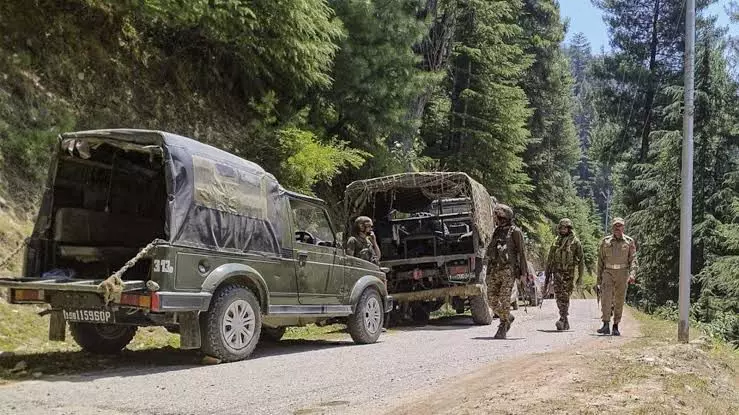Opinion: When tourists are targets—terrorism leaves psychological scars on peace, memories
Tourism isn’t just a business in Kashmir—it’s a fragile lifeline
By Anoushka Caroline Williams
Opinion: When tourists are targets—terrorism leaves psychological scars on peace, memories
Hyderabad: They came for the pine breeze, the pony rides, the quiet that Kashmir promises in its postcard-perfect valleys. They left in body bags, or not at all.
On April 22, a group of tourists strolling through the meadows of Baisaran in Pahalgam, Jammu and Kashmir, became the center of a calculated act of terror—one that didn’t aim for soldiers or police outposts, but civilians simply on vacation. The message was devastating in its clarity: even leisure is not safe.
But this attack wasn’t just about the bullets fired. It was about the psychological aftershock that now ripples through every would-be traveller, every local business owner, and every soul still trying to believe in Kashmir’s recovery story.
A different kind of target
“When you attack a soldier, the country mourns. But when you attack a tourist, the country panics,” says Dr Manmita Saran, a trauma psychologist speaking to NewsMeter. “It’s a shift in the language of fear—from strategic to symbolic. The terrorist isn’t just saying ‘you’re not safe.’ They’re saying ‘your joy, your freedom,m and your normal is not safe.’”
Tourists are not combatants. They’re symbols of peace, curiosity and trust. In Kashmir’s case, they’re walking proof of the government’s narrative that things are changing, improving and stabilising.
Which is why they’re now a bullseye.
The psychology of the soft target
“Terror thrives on spectacle, not scale,” explained Dr Rajat Menon, a behavioural warfare psychologist. “You don’t need a hundred casualties to shake a nation. You need one mother screaming on camera. You need one blood-stained vacation to stain a million imaginations.”
By targeting people who travelled to relax, connect or heal, terror groups hijack one of the most universal human pursuits: leisure. And the trauma they induce goes far beyond those directly affected.
“This kind of violence doesn’t just wound bodies,” Dr Saran added. “It pollutes memory. For survivors, the sound of gunfire now lives inside every photo they ever took on that trip.”
“Will my holiday get me killed?”
That’s the unspoken question now echoing in the minds of many, even those far removed from conflict zones. Travel agencies in North India report a spike in cancellations to Kashmir, airlines have quietly scaled down seasonal flights, and a series of Instagram influencers have either pulled their posts or replaced them with black squares in solidarity.
Dr Shazia Khan, who works with trauma-affected children, puts it bluntly: “Fear is viral. When you see violence in a place of beauty, it’s like watching your favourite lullaby turn into a scream.”
And that emotional rupture isn’t easily repaired. “People don’t remember statistics,” Dr Menon noted. “They remember how something felt. And Kashmir, right now, feels like danger.”
The local toll
For the pony riders, shikara boatmen and small hotel owners who’ve spent years rebuilding after Covid and curfews, the economic damage is personal.
Every time something like this happens, they have to start from zero. They host grief before we host guests.
Tourism isn’t just a business in Kashmir—it’s a fragile lifeline. And when tourists are gunned down, it’s not just a loss of income. It’s a loss of dignity.
What comes after
“The most dangerous thing that can happen after an attack like this,” Dr Saran warned, “is silence.” “When people stop talking about Kashmir, stop visiting, stop engaging—that’s when the psychological victory is complete.”
She urged the importance of narrative rebuilding: not sanitising what happened, but refusing to let terror be the only voice speaking for the Valley.
“We must grieve, yes,” she said, “but then we must reimagine.”
Reclaiming the meadow
What was stolen in Baisaran wasn’t just life—it was a sense of safety, a belief in the simple act of going somewhere beautiful and returning whole. That’s the cruel genius of modern terror: it doesn’t just end lives, it shrinks horizons.
But there is resistance in return. In refusing to reduce Kashmir to a conflict, in continuing to walk its trails, in speaking its name without fear. In the words of Dr. Menon: “The only thing stronger than fear is the decision not to live inside it.”
Until then, the meadows of Baisaran will carry two memories: one of blood, and one of bravery. The latter is ours to reclaim.